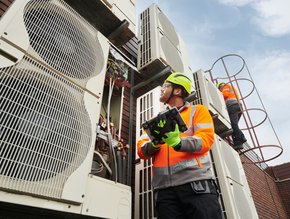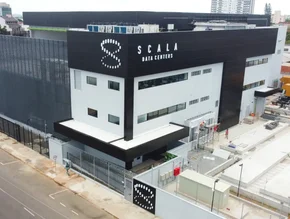Data Centres Power-Hungry for AI as Energy Consumption Rises

Data centres are the backbone of the digital world, accounting for roughly 1.5% of global consumption.
Operating giants like Amazon, Microsoft, Google and Meta are expanding extremely quickly, however demand is not matching up with supply. Access to suitable space and electricity is struggling, with the CBRE having forecast that average vacancy rates will drop to new lows of 8.2% across Europe.
With the market having expanded rapidly worldwide, on account of new AI and cloud-based technologies, companies are having to find new ways to be more sustainable and maximise renewable energy usage.
An urgent need for data centre sustainability
With the world reaching a ‘tipping point’ in AI development, the data centre industry is undergoing immense pressure to deliver.
Digital Realty cites that data centre energy consumption is expected to increase by 12% by 2030, due to resource-hungry workloads using advanced CPUs and GPUs that require advanced liquid cooling systems.
As a result, industry leaders are having to consider how to keep pace in a way that eases electricity and energy burdens, but that can generate real transformation for customers. Already, electricity demand is booming on account of AI, with the technology expected to consume as much electricity as a medium-sized country.
In particular, Europe has seen a huge surge in data centre operations, having recorded its largest-ever quarter in 2023. Whilst London remains the largest market with a 35% share of total tier one supply, Frankfurt in Germany is fast-becoming a transformative data centre market.
Such overwhelming expansions are inevitably putting pressure on data centres, with the industry already accounting for 2% of global greenhouse gas emissions - a figure that is only expected to grow.
With AI impacting development plans, there is a need for data centres to lower data centre carbon emissions. There are some companies like Equinix financing wind farms to offset emissions, however these efforts will soon be outdated at the rate that AI demand is growing.
Innovation must go hand in hand with sustainability in order for businesses to truly harness new technologies to their full potential. To address these concerns, data centre companies have a responsibility to address their sustainability strategies. They can do this by pushing forward on their Net Zero policies and considering more renewable resources.
Schneider Electric is an example of a company working to implement further Net Zero goals, in order to ensure that its data centres are operating in a climate-positive way. In fact, the company is currently offering solutions and services for its clients to build new sustainable data centres or upgrade legacy infrastructure.
******
Make sure you check out the latest edition of Data Centre Magazine and also sign up to our global conference series - Tech & AI LIVE 2024
******
Data Centre Magazine is a BizClik brand






